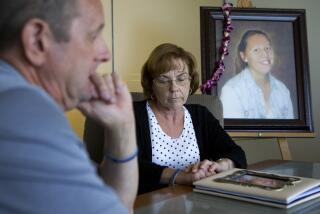For Some, a Reminder of Past Tragedy
- Share via
DANA POINT — Denise Jacobs knows the anguish first-hand. She knows about that visit that makes knees wobble, about the news that leaves people speechless.
She received such a visit after a drunken driver struck and killed her husband, a CHP officer who was responding to a hit-and-run incident in 1989.
“I understand what it’s like to get that knock at the door at 1:30 in the morning, when you know by the looks on their faces what they’re going to tell you,” said Jacobs, president of the Police Survivors Support Network, a group that counsels spouses, families and co-workers of fallen officers.
On Sunday morning, Jacobs’ phone started ringing early as the news spread among group members that CHP Officer Don Burt had been shot and killed Saturday during what appeared to be a routine traffic stop.
The support network was founded by 1993 by Ken and Marianne Wrede, of Anaheim Hills, whose son, Ken, a West Covina police officer, was shot to death by a man on drugs in 1983.
“It changed our whole life,” Wrede says. “There’s a missing plate at Christmas and holidays that will always be there.”
Wrede and other group members try to help other grieving relatives at regular meetings, frequent telephone calls or one-on-one visits. The network consists of families and co-workers of those killed in the line of duty and helps survivors get through the grief.
*
Jacobs keeps the grim count of those who die. Burt was the eighth officer to die in Orange County since 1990, and the fifth to die in California this year, she said.
“We offer our support, but we don’t impose on the family,” Jacobs said. “The first day, the first week and often for the first month, the survivors are surrounded by friends and family. But as time goes on, we’re there for them.”
One person the group helped is Tammi Andersland, whose father, Palos Verdes police captain Mike Tracy, was killed by a marauding gunman while attending a police training session at the Torrance Holiday Inn.
Hearing about Burt’s death Saturday night, she said, forced her to relive the moment two years ago when she first received her own devastating news.
“I had just made Valentine’s Day dinner for my father and stepmother and taken it to their home,” Andersland recalled. “I saw a helicopter hovering over the Holiday Inn; I knew my dad was there, but I didn’t make the connection.”
From the moment she was told of her father’s death until now, Andersland said, “I’ve been trying to put my life back together. It is horrifying and it has left our family with a deep empty feeling inside. It’s hard to pick up the pieces afterward and when you hear of another officer going down, your heart starts racing. You know what they’re going to go through and you ache for them. Sometimes it’s like going through the whole nightmare again.”
For Andersland, part of that nightmare has been learning to deal with the anger she feels about her 50-year-old father’s death, as well as a shattered sense of safety and faith in people.
“The fear is always there,” Andersland said. “I’m more fearful of things today. I’m afraid of going to the mall at night. I lock my doors. I don’t let my children play in front of the house. I still believe there are good people out there, but more and more today all we hear about is the negative.”
Many survivors of officers killed in the line of duty have trouble dealing with the random suddenness of the loss, according to Jacobs.
“Some people feel, well, with that type of job, what do you expect?” she said. “But police families do not focus on the fact that their loved ones could be killed at any time.
“It’s the suddenness, the cruelty when an officer is killed intentionally that hurts the worst,” she said. “Because they’re out there protecting you and me and making the streets safe, then their lives are taken.”
Andersland concurs.
“It’s something you never think is going to happen to you,” she said, “and when it does, it completely takes you off your feet.”
*
That is certainly true of the Wrede family, whose son was 26 on the day he was killed.
“My life will never be the same,” Ken Wrede said. “I deal with it every day; when I hear a police siren and immediately think of my son, when I pull up next to a police car and think that that could have been him. I still stop as often as I can and tell the officers to have a good day and be careful.”
He has advice for Officer Burt’s survivors.
“Reach out,” he said. “There are a lot of people in the same situation. You can’t bury it. The more you talk about it, the easier it becomes. It’s apparent that it’s something you never get over, but you learn to deal with it as time goes on.”
Also contributing to this report was Times staff writer Lee Romney.
More to Read
Sign up for Essential California
The most important California stories and recommendations in your inbox every morning.
You may occasionally receive promotional content from the Los Angeles Times.













